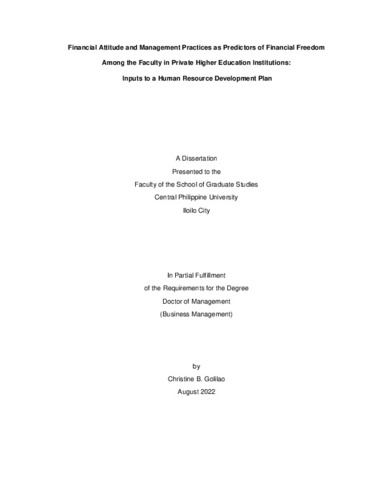Financial attitude and management practices as predictors of financial freedom among the faculty in private higher education institutions: Inputs to a human resource development plan
摘要
This survey-predictive-correlational research was conducted to determine the financial attitude and management practices as predictors of financial freedom among the faculty in private higher education institutions in Iloilo City as inputs to a Human Resource Development Plan. Conducted in May 2022, 205 randomly selected regular full-time faculty members in three private HEIs for academic year 2021-2022 responded to the four researcher-made data-gathering instruments—the Financial Literacy Questionnaire; a Rating Scale on Financial Attitude; a Rating Scale on Financial Management Practices; and a Rating Scale on Financial Freedom. Data-gathering was administered through an electronic form (google form) with the link sent via email or through other social media platforms such as Facebook and Messenger. Six identified respondents from the three private HEIs were invited to a Zoom meeting for the Focused Group Discussion. Transcribed data were utilized for qualitative analysis. Quantitative data were processed via the Statistical Package for the Social Sciences (SPSS) software, version 2.0. Frequency count, percentage analysis, means, and standard deviations were employed in the descriptive data analysis. The Pearson's r and the Multiple Regression Analysis, set at .05 alpha level, were employed in the inferential analysis. Study results revealed the following: The respondents had high literacy in budgeting and debts/borrowing and average literacy in savings/investments. Generally, they had positive financial attitude when taken as an entire group and in terms of debts/borrowings, and savings/investments; and very positive attitude in terms of budgeting; practiced financial management in all three constructs—budgeting, debts/borrowings, and savings/investments to a high extent; and had high financial freedom in all three constructs—availability, sufficiency, and savings/investments. Majority of the socio-demographic profile and financial literacy profile were positively and significantly related to financial attitude in all three constructs--budgeting, debts/borrowings, and savings/investments; financial management practices in all three constructs-- budgeting, debts/borrowings, and savings/investments; and financial freedom in all three constructs--availability, sufficiency, and savings/investments. Financial attitude, financial management practices and financial freedom (in majority of their identified constructs) were positively and significantly related. Financial management practices in terms of savings/investments, financial attitude, and number of dependents were significant predictors of the respondents’ financial freedom in terms of availability. Financial management practices in terms of savings/investments; financial attitude in terms of savings/investments; number of dependents, overall financial literacy; and net take-home pay were found to significantly predict the respondents’ financial freedom in terms of sufficiency. Financial management practices in terms of savings/investments, age, academic rank, income from other sources, and financial attitude in terms of debts/borrowings were found to significantly predict the respondents’ financial freedom in terms of savings/investments. A Human Resource Development Plan for Private Higher Education Institutions was prepared as an offshoot of the study.
描述
Abstract only
建议引文
Golilao, C. B. (2022). Financial attitude and management practices as predictors of financial freedom among the faculty in private higher education institutions: Inputs to a human resource development plan (Unpublished Doctoral dissertation). Central Philippine University, Jaro, Iloilo City.
文件类型
Dissertation主题
部
School of Graduate Studies学位
Doctor of Management (Business Management)货架位置
GSL Theses 658.0072 G581
物理描述
xv, 180 pages


